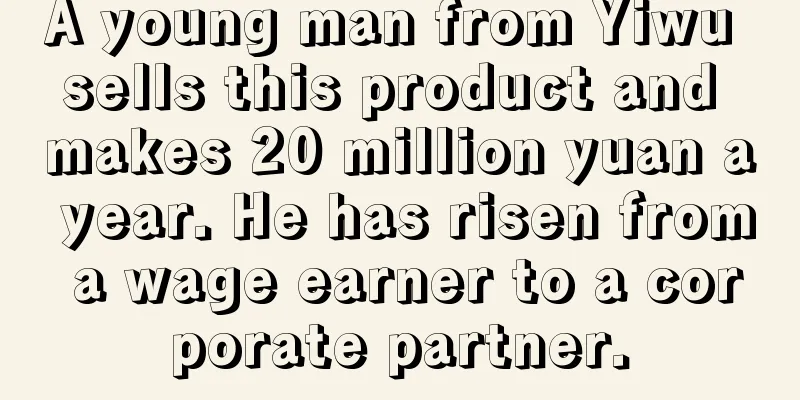Pang Donglai, another “Mi Xue Bing Cheng”?

The most fascinating question of this summer has finally emerged, that is, where does Pang Donglai get so much enthusiasm to help his peers? As its fame grew, this local retail enterprise in a remote corner of the country galloped across the country like a white knight, and then, like Ma Liang's magic brush, turned stones into gold, making those troubled retail enterprises seem to be revived overnight. According to recent media reports, among the companies assisted by Pangdonglai, on the first day of Yonghui Supermarket's opening after the "adjustment and reform", the customer flow was 5.3 times the average daily customer flow before the adjustment, and the sales were 13.9 times the daily sales before the adjustment; Hunan Bubugao Supermarket's customer flow and daily sales hit new highs after the "adjustment and reform". On the fourth day after the adjustment, the daily sales exceeded one million, which is about 6.7 times the average daily sales before the adjustment, and the customer flow reached 6.5 times the average daily customer flow before the adjustment; Guizhou Heli Supermarket had a customer flow of 8,955 people on the first day of its opening after the "adjustment and reform", and sales exceeded 920,000, a year-on-year increase of 272%. What is even more commendable is that Pang Donglai, the "miracle doctor" in the retail industry, does not charge "consultation fees". There are even claims that Pang Donglai is "paying for it" and even bears the travel expenses when providing on-site guidance. This really gives me a sense of what China is like. But is this the whole truth? In fact, if you study the cooperation model between Pang Donglai and other supermarkets, you will find that under the dazzling news offensive, it is a good business. First of all, this kind of cooperation has a high threshold for risk, and it is no big deal if it fails. Many retail companies have already been on the decline, as "Returning offline to offline, new retail is coming to an end" previously published by "Zuihua", and it has reached the point where they have to make a last-ditch effort. But if it is done well, companies like Yonghui and BBK will be saved from the dire situation, and Pangdonglai, after this battle, will not only become famous, but will also "give birth to a child" and sell its own-brand products all over the country. It is understood that Pang Donglai is forming an alliance with the "Lianshang Donglai Commercial Research Institute" as the core. Most of the member companies are local chain supermarket brands. By accepting assistance from Pang Donglai, these local supermarkets have completed the transformation of various dimensions including stores, services and products around offline scenarios. In terms of product structure, a considerable number of member companies have made adjustments. In addition to removing third- and fourth-tier brand products from the shelves, retaining and adding first- and second-tier brand products, they have also introduced Pang Donglai's own brand products. For example, Chengdu Linni Supermarket, a member of the seed class of Lianshang Donglai Commercial Research Institute, mentioned in its "Product Adjustment Announcement" that more than 70% of its products are planned to be consistent with Pang Donglai. In addition, supermarket brands that have accepted "help" from Pangdonglai include large national chain supermarkets, including Yonghui Supermarket, Hunan Bubugao Supermarket, etc. Their pilot stores have also made substantial adjustments to their product structure. The product structure of stores that have accepted "adjustments" has even reached more than 90% of Pangdonglai's. If you think about it carefully, Pangdonglai's support model is similar to the most popular supply chain franchise model in terms of business form: franchisees open stores, bear the rent and personnel costs, and the brand exports supply chain products and standardized service capabilities. Coincidentally, the most successful supply chain franchise company is also in Henan, that is, Mixue Bingcheng. Of course, the relationship between Pangdonglai and its assisted targets is much looser than that between Mixue Bingcheng and its franchisees. For example, its partners are not small shop owners, but mature chain brands, or we can call this method "soft franchising." This "softness" is mainly reflected in the brand. Obviously, in the short term, it is impossible for Pang Donglai to hang its own brand on Yonghui's store. But the reality is that Pang Donglai's brand has become their source of traffic. As Yu Donglai said, "Going to Yonghui is like going to Pang Donglai, isn't it?" To some extent, these "helped" people have become another Pang Donglai. Sometimes, the brand is not on the door, but in the hearts of consumers, just like joining a franchise does not have to be announced, as long as it is tacitly understood in the circle. 01Yu Donglai is regarded as the most "conservative" entrepreneur in China. He started his business as early as 1990, and has not left Henan, nor even Xuchang and Xinxiang. It is said that this choice is related to his early experience. After more than 30 years of business and several ups and downs, Yu Donglai has become a very cautious person. Therefore, not only is Pang Donglai's offline expansion slow, but even its online business is also very restrained. At present, only a small number of products such as bath towels, laundry detergent, and white wine are available online in the Pangdonglai mini program. Although the two Douyin accounts have accumulated more than 4 million fans, there are only more than 20 kinds of products in the display window, including a large number of "DL combination gift boxes." However, a company always has to answer the question of development, especially when the company has grown strong and famous, just like a young man who has passed adolescence and the desire for development has already pushed out his Adam's apple. The paradox is that if Pang Donglai insists on opening stores only in Xuchang and Xinxiang, it has actually hit its ceiling. According to previous reports, Yu Donglai estimated that Pang Donglai's sales in 2023 would be around 10 billion yuan, with a net profit of 140 million yuan, while the total retail sales in Xuchang and Xinxiang in 2023 would only be around 250 billion yuan. So, what should Pang Donglai do next? Is leaving its hometown its only option? If the answer to this question is yes, Pang Donglai will first face the cost pressure brought by offline expansion, including store rent, personnel costs, etc., in addition to the expansion of management boundaries. These pressures also mean risks, especially at a time when the growth rate of the entire social retail industry is slowing down, it is simply a "gray rhino" facing all national chain retail companies. Is there a way to achieve scale growth without requiring companies to bear the riskiest part of the entire business chain? If we don’t limit our focus to supermarkets, we can learn from the experience of other chain industries. For example, Mixue Ice City, also located in Henan, solved the above problem by using supply chain franchising. As of September 30, 2023, Mixue Ice City has more than 36,000 stores, covering China and 11 countries overseas. Mixue Ice City, which relies on the franchise model to conduct business, has franchise stores accounting for as high as 99.8%. But interestingly, Mixue Ice City does not make money from franchise fees. In its prospectus released at the beginning of the year, Mixue Ice City mentioned that its franchise fee accounted for only 2%, while the sales of goods and equipment accounted for 98%. This set of data also led the industry to describe Mixue Ice City as a "supply chain company in the guise of a milk tea company." It is understood that the franchise fee of Mixue Ice City ranges from 7,000 yuan/year to 11,000 yuan/year, and the franchise threshold is extremely low. However, after becoming a franchisee of Mixue Ice City, you must purchase ingredients, packaging materials, equipment and facilities from Mixue Ice City. In this process, Mixue Ice City actually plays the role of a "supplier". This "supply chain franchising" model is the key to Mixue Bingcheng's continued profitability. Mixue Ice City's prospectus mentioned that its costs are mainly sales costs, which include the costs of purchasing and processing raw materials, packaging materials and store equipment, as well as logistics and distribution costs. In addition, Mixue Ice City also needs to bear marketing, R&D and other expenses, as well as the company's employee wages, of course, these do not include the store rental costs and store employee wages of franchise stores. In contrast, today's support model of Pang Donglai is similar to supply chain franchising. On the one hand, whether it is hard franchising or soft franchising, or support, it is a common benefit logic at the bottom. As Yu Donglai said, "We are not involuntarily, but mutually accomplished. We have transformed from an immature and jealous mentality of only wanting to defeat our opponents to becoming comrades in this industry and benefiting our society together." On the other hand, the introduction of Pang Donglai's own brand products is an important part of receiving "assistance", which also makes Pang Donglai a supplier for the "assistance" targets. A relevant person in charge of Bubugao told the media that the sales of Pang Donglai's own brand products accounted for almost one-third of Bubugao supermarkets. 02In the retail industry, private label products are not original to Pang Donglai. In fact, in recent years, developing private labels has become an important strategy for many supermarket chains. A person close to Hema told "Zui Hua" that because Hema adopts direct sourcing from the source, its own-brand products can have a gross profit margin 10 percentage points higher while being sold at a price 30% lower than products of the same quality. Generally speaking, the gross profit margin of a retail enterprise is required to be around 30%. That is to say, for a product priced at 1 yuan, the supply price is 0.7 yuan, the retailer earns 0.3 yuan, and the supplier will also retain some profit margin for himself. If the product is a private brand, the retail company can set the selling price at 0.7 yuan, but it gets the profit share of the supplier in the supply chain. Calculated according to Hema's formula, the gross profit is 0.28 yuan. It can be seen from this that in the category of private label products, retail companies can, on the one hand, drive more sales through low prices, and on the other hand, still achieve considerable profit margins. It is worth noting that from the price tags of some products that have been circulated, Pang Donglai, which has won a good reputation for "high quality and low price", has not reserved a 30% gross profit margin for its own brands, but it still has greater flexibility compared to other brands. For example, the gross profit margin of a piece of its own brand clothing is marked as 28%, while the gross profit margins of other brands of clothing are mostly around 22%. Of course, there are also some discounted own brand products that are sold at almost the same price. But in any case, when Pangdonglai's own brand enters supermarkets such as Yonghui and Bubugao, Pangdonglai, as a supplier, should obtain corresponding profits. Referring to the profit reserve space that Pangdonglai gives to suppliers, this level may be between 5% and 15%. Moreover, in this kind of cooperation, Pangdonglai does not need to absorb various corporate costs within the limited gross profit margin like a cooperative supermarket. It only needs to place orders with its suppliers based on sales. This is the charm of supply chain franchising. At the same time, under this model, as the scale of terminal sales expands, upstream suppliers can further control costs and increase efficiency. Take Mixue Bingcheng as an example. It has further reduced costs by building its own production base, logistics distribution network, warehousing system, etc. The global procurement network directly connected to the production area and the super-large procurement scale also make the price of Mixue Bingcheng's core raw materials lower than the industry average. In its prospectus, Mixue Bingcheng mentioned that its self-production costs were about 49% lower than the external purchase price during the first nine months of 2023; the purchasing costs of milk powder and lemons of the same type and quality in 2022 were 10% and 20% lower than the industry average respectively. In the name of providing franchisees with "competitive one-stop solutions", Mixue Bingcheng became the only "supplier" for franchisees, which enabled it to generate tens of billions of yuan in revenue for three consecutive years relying on its supply chain. 03Because of a somewhat "try everything possible" mentality, retail companies that accept support from Pangdonglai have a strong desire and motivation to reform. Yu Donglai mentioned at a sharing session at Heli Supermarket in Guizhou, "Within three months, we will remove all substandard items from the shelves. We would rather have nothing than inferior products. Perhaps what you are most distressed about now is the tens of millions of yuan in entry fees, display fees, barcode fees, etc. from these brands, but we must give up something and do it unswervingly." This also means that, like Guizhou Heli Supermarket, "soft franchise" Pangdonglai supermarkets have abandoned their original profit model and can no longer charge suppliers various additional fees. They can only bet almost all of their income on the supply chain, one in and one out, simple and clear. In other words, the supermarkets being assisted are exchanging volume for price by compressing their own profit margins. In addition to reducing charges to suppliers, they are also aligning themselves with Pangdong in terms of service granularity and employee treatment. "Zui Hua" found that as a member company of Lianshang Donglai Business Research Institute, Qinghai's chain supermarket brand "Qinghai Yijiaqin" has set up the same direct drinking water machine and wash basin facilities as Pang Donglai, and even carried out localization transformation, adding a variety of tea drinks that suit the tastes of locals. The supermarket clerk also told us that after the transformation, wages are linked to performance, but the overall increase has been made, and the working hours are also limited to seven hours. Overall, through assistance, most supermarkets will seek to break even with a lower profit margin. Of course, this is not impossible, as long as supermarkets can achieve a larger and more stable long-term sales scale after the "adjustment" of Pangdonglai. Objectively speaking, this possibility does exist. After all, Pang Donglai is an evergreen "topic star", and after this period of public opinion heat, many people who did not know Pang Donglai before have also become curious. Over a period of time, favorability and curiosity can be converted into traffic entering the store and consuming. But in the long run, this kind of cooperation actually implies uncertainty. The success of Pangdonglai has its unique characteristics, which is scarcity. As we all know, things are valuable only when they are rare. Many supply chain franchise companies have repeated similar paths. At first, the brand made a name for itself in the market with a unique selling point, and then opened up franchisees. As more and more franchisees came, multiple stores appeared in a region, the public began to become desensitized, and franchisees fell into disorderly competition. For example, a franchisee of a certain brand told Zui Hua that he did make money in the first two years of joining the franchise, but later lost it all. When Pang Donglai was in a remote corner, it became a "myth" due to its reputation for price and service, and it was given a halo, which aroused the curiosity of outsiders and even led to purchasing on their behalf. This is scarcity. But after supermarkets cooperated with Pang Donglai, Pang Donglai brand products can be seen everywhere. Although they directly reach customers, the scarcity has disappeared, and it has gradually become a homogenized product, no longer having a "mental premium". In fact, even self-operated chain brands have experienced similar pain. Take Haidilao, a restaurant brand that also provides high-quality services, for example. After a period of rapid expansion, Haidilao also experienced a period of declining table turnover rate in the past few years. It was not until the last one or two years that Haidilao began to rethink the regional supply and demand relationship and closed some stores, which rekindled its motivation for growth. However, whether a brand adopts a direct sales model or a franchise model, the profit mechanism is different after all. The former is to balance in one financial statement, while the latter has its own account book. The brand will not cover the bottom line for the franchisee, as long as it sells more goods. To be even more cruel, even if the long-term effect of this "assistance" experiment is not as good as expected, it is just a bold attempt by Pang Donglai to move out of Xuchang and Xinxiang. Even if it fails, it will not damage the basic base. However, for the "soft franchisees" who are "assisted", they will need to work in a smaller shell for a long time and keep fighting against traffic anxiety. At present, there are two main ways to solve this problem: the first is to replicate Pang Donglai’s services; the second is to introduce Pang Donglai’s own brand products. But in the long run, these supermarkets still need to internalize the above-mentioned levers into their own capabilities, so that they can truly control their own destiny. After all, under the premise of ensuring that the national selling price of Pangdonglai brand products remains the same, the gross profit margin that "soft franchisees" can obtain in the sales process is likely to be compressed, or even lower than that of other brands of products, because for them, these products are not directly purchased from their own sources, that is, they need to retain a portion of the profit for the supplier, that is, Pangdonglai. Of course, if these products can all play the role of attracting hot products, the merchants' profit sharing is nothing more than a concubine, but how many hot products does a supermarket really need? In addition, Pangdonglai has already formed a private-label product system with extremely rich SKUs. How many of them can really play the role of attracting traffic? As one of the earliest supermarkets to receive assistance, "Qinghai Family" gave us answers to these questions. A few days ago, a clerk at the Qinghai Family store in Xining Qinhu told us that at the beginning, the sales of Pang Donglai beer were very good, and they even limited the purchase. But on that day, we waited in front of the beer cabinet for a long time, and found that there were very few people coming to get Pang Donglai beer. There were tea containers nearby, and we tried to find Pang Donglai jasmine tea. Another clerk simply advised us to buy "Qinghai Family" tea: "We learned the business philosophy of Pang Donglai's 'direct sourcing from the source', and the quality of our own tea is also very good." In fact, this store does not have Pang Donglai jasmine tea at all, nor does it have any plans to purchase this product, because it has its own tea directly sourced from the source. After all, soft franchising is not a real franchising, and it must first consider its own interests. From the perspective of game theory, "soft franchisees" cannot assume that Pang Donglai is selfless, so the best strategy is actually: learn it, and after learning it, walk on your own. So, in this drama, the two are married in form but not in spirit. All the players should have been prepared to break up at the moment they shook hands. |
>>: Catering is trapped by low prices, and group buying destroys the experience?
Recommend
Can I modify the price after listing on Shopee? How to set up discounts?
As e-commerce platforms continue to grow, more and...
Haidilao makes a fortune through marketing
Haidilao has always won by serving customers, and ...
How can a brand remain popular?
Why did the previously popular brands suddenly dis...
Will Shopee call you when you open a store? How to run a store?
Shopee cross-border e-commerce platform has a huge...
Short short play "saves" Hengdian ensemble
In 2023, the micro-short drama track was very popu...
How to find Shein's best-selling products? How to create best-selling products?
As a popular fashion e-commerce platform, Shein ha...
The evolution of the anchor with millions of fans: Dare to break through yourself and find a bigger stage on Douyin
What is the secret of traffic for these two anchor...
What are the requirements for opening a store on Facebook Mall? What information is required?
Facebook is a social networking site, just like We...
What is the Lazada transaction fee? How does Lazada charge commission?
If you want to open a store on Lazada, merchants m...
After the explosion of "Tao Baibai", is the metaphysics track profitable?
Starting from the perspective of Internet metaphys...
The trend of celebrities selling goods has receded, and the live streaming market is gradually maturing
Livestreamers are an important and indispensable f...
Plant-themed outfits remain popular. How can businesses take advantage of content trends on Xiaohongshu?
"Plant-style outfits" have quickly becom...
How to compress images after uploading them to Amazon? How to optimize images?
On the Amazon platform, high-quality product image...
At the end of 2022: My thoughts on brand-effect integration, consumption changes, and minimalist marketing
The new year has come. Looking back at the past ye...
Let’s talk about the truth about how stakeholders make money, why SAAS has no ability to resist risks!
I don’t know if you have ever thought about this q...









